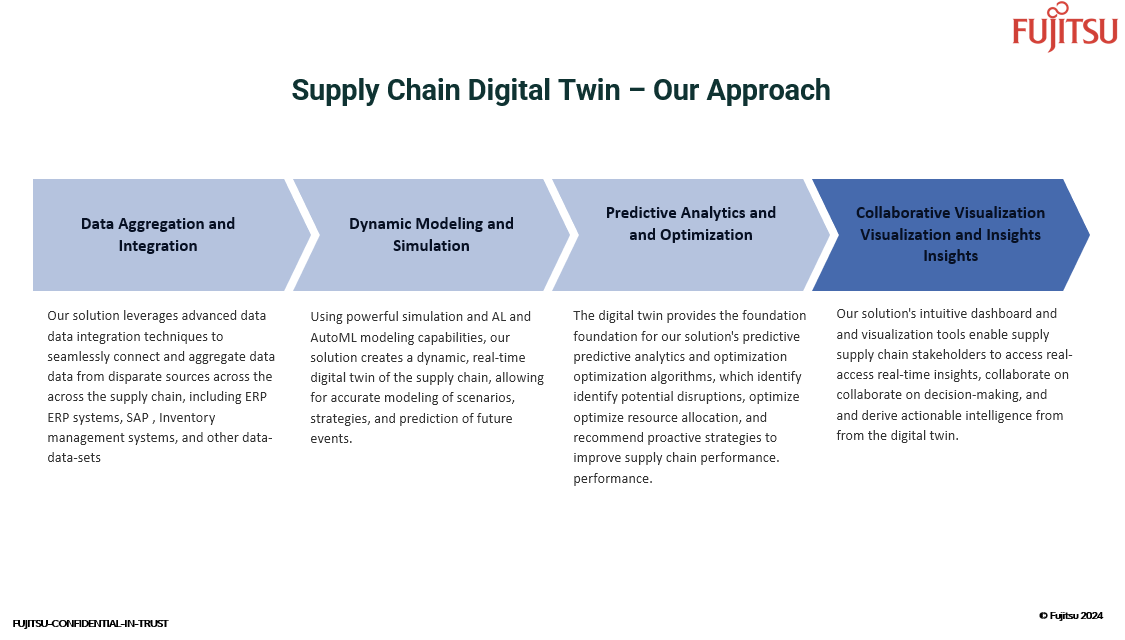Unlocking the future of digital supply chains: A focus on manufacturing and utilities
Fujitsu / February 4, 2025
In today's dynamic business landscape, manufacturing and utilities companies face unprecedented challenges. From global supply chain disruptions and fluctuating market demands to the increasing complexity of operations, these industries require a robust and agile approach to thrive. This article explores the critical role of data-driven decision-making in unlocking the future of digital supply chains, with a specific focus on overcoming the challenges faced by organizations.
In the midst of their digital transformation journey, organizations have been striving to mitigate supply chain challenges, from disruptions and delayed deliveries. These factors can contribute to significant overhead costs. However, these challenges have intensified further due to factors such as recent company acquisitions, Enterprise Resource Planning (ERP) migrations or enhancements, and critical operational phases characterized by data and application silos. This necessitates quick-win solutions.
Let’s delve into the significance of a holistic view of the supply chain and how leveraging advanced technologies like Fujitsu's Data Intelligence Premium (DI Premium) can empower businesses to enhance operational efficiency, improve decision-making, and gain a competitive edge.
The imperative of data-driven decision making
In an increasingly interconnected world, the ability to make informed decisions quickly and accurately is paramount. For manufacturing and utilities companies, this translates to:
• Predictive maintenance: Anticipating equipment failures and minimizing downtime.
• Demand forecasting: Accurately predicting market fluctuations and adjusting production accordingly.
• Inventory optimization: Reducing inventory costs while ensuring adequate stock levels.
• Risk mitigation: Proactively identifying and addressing potential supply chain disruptions.
• Enhanced customer service: Meeting customer demands efficiently and effectively.
However, achieving these goals is hindered by several key challenges:
• Data silos: Information is often fragmented across various systems, departments, and even companies, making it difficult to gain a comprehensive view of the supply chain.
• Data complexity: Dealing with diverse data sources, including structured and unstructured data, requires sophisticated analysis capabilities.
• Rapid change: The dynamic nature of the business environment necessitates agile decision-making and the ability to adapt quickly to changing conditions.
Overcoming challenges with a holistic view
To overcome these challenges, organizations must adopt a holistic approach to supply chain management. This involves:
• Breaking down data silos: Integrating data from various sources, including ERP systems (especially when different versions or applications are used), IoT devices, and external market data, to create a unified view of the supply chain.
• Leveraging advanced analytics: Employing AI and machine learning algorithms to identify patterns, predict trends, and gain deeper insights from data.
• Empowering decision-makers: Providing real-time access to data and insights to enable informed and timely decision-making.
The role of Fujitsu DI premium
Fujitsu DI premium, powered by Palantir and Fujitsu Kozuchi AI, is a powerful data intelligence platform that can help organizations unlock the full potential of their data. Key benefits include:
• Enhancing operational efficiency: By leveraging the platform to capture unstructured and siloed data within diverse applications and layers, DI premium provides a unified view of the supply chain, enabling organizations to identify inefficiencies and optimize operations.
• Expanding product lines and Functionalities: DI premium's advanced analytics capabilities allow businesses to explore new opportunities, expand product lines, and develop innovative solutions.
• Proactive suggestions and automations to support critical decisions: DI premium can provide proactive suggestions and automate routine tasks, freeing up valuable time for decision-makers to focus on strategic initiatives.

Conclusion
In conclusion, the future of digital supply chains lies in data-driven decision-making. By breaking down data silos, leveraging advanced analytics, and empowering decision-makers with the right tools and insights, manufacturing and utilities companies can navigate the complexities of the modern business landscape and achieve sustainable growth. Fujitsu DI premium, with its powerful capabilities and focus on collaboration, is a key enabler in this journey. By investing in DI premium, organizations can unlock the full potential of their data and gain a significant competitive advantage.
What’s next? Fujitsu would like to invite you to schedule a coffee chat or virtual meeting. Stay tuned for upcoming events and workshops where you can bring your sample data and we can explore the roadmap to supply chain resilience together.

Editor's Picks












